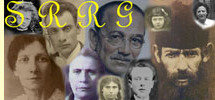

The WOHL (WAHL) Family Biography
Submitted by Robert Latzer
WOHL: - WAHL (also Vahl, Wohl) - Ashkenazic name meaning
"ox."Variations in other languages, some of which are related, are OCHS, SCHOR,
BYK and VOLOV.Polish and Russian Jews with this name can probably trace their
ancestry to Saul Wahl (1541-1617), a prominent Polish citizen... from Finding
Our Fathers: A Guidebook to Jewish Genealogy by Dan Rottenberg published by
Random House, NY, 1977.
The family is evidently related to the famous KATZENELLENBOGENs, a rabbinic
family earliest records of which are found in Germany in 1312. According to Dan
Rottenberg, the [KATZENELLENBOGEN] family has "thousands of descendents and huge
family connections throughout Europe and America." At this writing, no
connection whatever has been established between the family of David Wohl and
any of these forbears. But such a fanciful ancestry is always pleasant to
contemplate.
David WOHL made a good portion of his life in the small town of Chorostków in
what is now the western part of Ukraine, somewhat southeast of Lviv (earlier
known as Lvov and Lemberg to the Germans). That is not to say that Chorostków
was the only place he lived. In fact, since he had three wives, and sons were
born to him in Grzymalów and Tarnopol, he must have moved around quite a bit.
His parents were Isaac and Shindl Wohl, who also lived in Chorostków. Since
David was born in 1864, Isaac must have lived in the second and third quarters
of the 19th century. But so far we know nothing about him or his wife. Whether
they had more than two sons we also don't know. But David had a brother, Asher,
who married Miriam BARD. Of the two, Asher made much more of a success for
himself in Chorostków than did David. Most of the Jews in that town lived in or
near the center. They were small tradesmen, grain or horse dealers, skilled
craftsmen, generally not farmers. Farming was left to the non-Jewish members of
the town, who generally lived (and farmed) the outskirts.
David, on the other hand, must have lived on the outskirts, generally the poorer
section of town. Asher's family rarely had much to do with the David Wohls.
Perhaps David's economic status had something to do with his need to move from
town to town, looking for another woman after his wife, Yetta PARNAS, had died.
So the Wohl name became known not only in Chorostków but also in the nearby
towns of Grzymalów and Tarnopol. In the former, David married Chaya GELMAN. In
Tarnopol, after Chaya had died, he married Yetta GREENSPAN.
Neither David nor Asher ever emigrated to the U.S. But David's 7 children did:
Sam and Morris (from his first wife); Simon, Harry and Bessie (from his second -
in Grzymalów); Sol and Sarah (from his third - in Tarnopol). Of David's three
wives, only his last, Yetta STEINHOUSE, outlived him, migrating to this country
with Sol and Sarah in 1921.
The children, or at least the men children of David carried on, in this country,
the merchant tradition of their father, uncle Asher and probably their
grandfather Isaac. Sam became a milk deliveryman and salesman in the Bronx.
Morris opens a small grocery store in East Orange, later moved it to Newark, and
when Prohibition ended, was one of the first to get a liquor license in that
city and open a liquor store, first as an adjunct to the vegetable store, then
finally as a replacement for it. Simon started and prospered at his own window
washing business in Brooklyn. Sol worked in "shmates," in the garment district,
eventually becoming a production manager. The three other children, Harry,
Bessie, and Sarah, we know little of. Sarah lived with her mother, Yetta
Steinhouse ("the old lady") until she married. After Alex, her husband died, she
became a rather reclusive figure. We know very little of Harry and Bessie.
This page is hosted at no cost to the public by JewishGen, Inc., a non-profit corporation. If you feel there is a benefit to you in accessing this site, your JewishGen-erosity is appreciated.
Last updated
01/08/06 by ELR
Copyright © 2006 SRRG